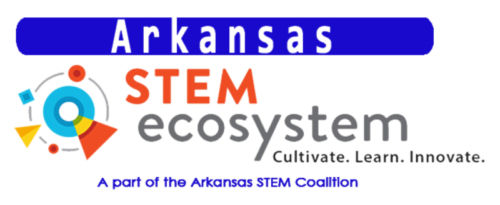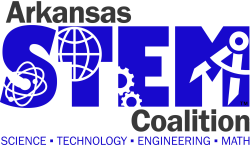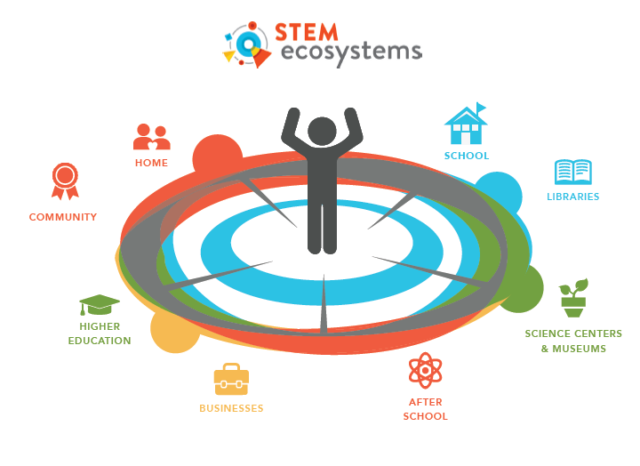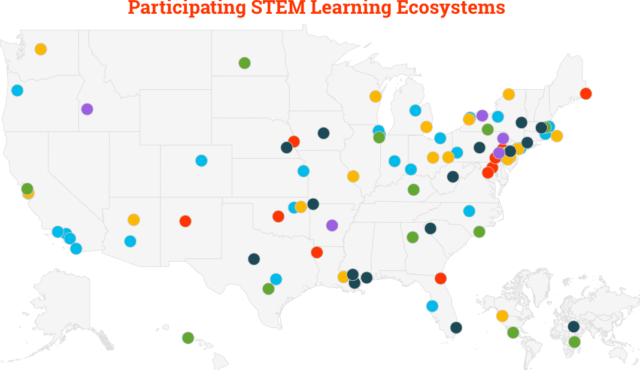Arkansas STEM Ecosystem
Since 2010, the Arkansas STEM Coalition has served as a convener and catalyst for quality STEM education and career-connected learning in Arkansas. As the backbone organization for the Arkansas STEM Ecosystem, the STEM Coalition brings together cross-sector partners to fulfill the vision that Arkansas is a state where all people have equal access and opportunity to engage in quality science, technology, engineering, and mathematics learning experiences that increase their ability to succeed in education, career, and community, leading to a vibrant and dynamic state economy.

Arkansas STEM Ecosystem Mission Statement
The mission of the Arkansas STEM Ecosystem is to cultivate innovative opportunities for educators, students, communities, business and industry to build a competitive Arkansas workforce and economy.
Arkansas STEM Ecosystem Partners
- Apprenticely (formerly Arkansas Center for Data Science)
- Arkansas Advanced Energy Foundation
- Arkansas Department of Transportation
- Arkansas Department of Workforce Services
- Arkansas Discovery Network / Arkansas Museum of Discovery
- Arkansas Division of Career & Technical Education
- Arkansas Division of Elementary and Secondary Education
- Arkansas Division of Higher Education
- Arkansas Economic Development Commission
- Arkansas Educational Services Cooperatives
- Arkansas Educational Television Network (AETN)
- Arkansas Environmental Education Association
- Arkansas Out of School Network
- Arkansas Regional Innovation Hub
- Arkansas Tech University
- Arkansas Tech University STEM Education Collaborative
- A-State
- A-State Delta STEM Education Center
- A-State Rural STEM Education Center
- Cabot Public Schools
- Career Blade
- Clinton School of Public Service
- EAST Initiative
- Economics Arkansas
- Electric Cooperatives of Arkansas
- Harding University
- Harding University Lewis “Tony” Finley STEM Center
- Henderson State University
- Jacksonville North Pulaski School District
- Learning Blade
- LISA Academy
- Little Rock School District
- Little Rock Zoo
- Mid-America Science Museum
- National Science Teachers Association
- North Little Rock School District
- Northwest Arkansas STEM Ecosystem
- Project Lead The Way
- Pulaski County Special School District
- Ready for Industry
- Southern Arkansas University STEM Center for K-12 Education
- The Generator Innovation Hub/ Go Forward Pine Bluff
- The STEM Center at Henderson State University
- Scott Family Amazeum
- STARBASE Arkansas
- STRIVE
- University of Arkansas Division of Agriculture | 4H Youth Development
- University of Arkansas
- University of Arkansas at Fort Smith
- University of Arkansas at Fort Smith STEM Education Center
- University of Arkansas at Little Rock
- University of Arkansas at Little Rock STEM Education Center
- University of Arkansas at Monticello
- University of Arkansas at Monticello STEM Center
- University of Arkansas at Pine Bluff
- University of Arkansas at Pine Bluff Center for Math/Science Education
- University of Arkansas Pulaski Technical College
- University of Central Arkansas
- University of Central Arkansas STEM Institute
- Vilonia School District
- Women’s Foundation of Arkansas
What is a STEM Ecosystem?
(quoted from STEM Ecosystems)
“A STEM Learning Ecosystem encompasses schools, community settings such as after-school and summer programs, science centers and museums, and informal experiences at home and in a variety of environments that together constitute a rich array of learning opportunities for young people. A learning Ecosystem harnesses the unique contributions of all these different settings in symbiosis to deliver STEM learning for all children. Designed pathways enable young people to become engaged, knowledgeable and skilled in the STEM disciplines as they progress through childhood into adolescence and early adulthood.”
Resource Alert: Building and Strengthening STEM Learning Ecosystem: A Growing Guide to Success
“Launched in 2019, the STEM Learning Ecosystems Discussion Series features conversations with Ecosystem leaders from around the world about the most pressing topics facing their communities today. Topics of high interest were identified through survey data and the self-assessment, Ecosystems Indicator Tool (EIT).
“The guide highlights five key topics: business engagement, communications, governance, programs & initiatives and fundraising. For each topic, the guide provides concrete examples from leaders representing a variety of STEM Learning Ecosystems, key takeaways, webinars available for playback and more.”
Check out Building and Strengthening STEM Learning Ecosystems: A Growing Guide to Success from STEM Ecosystems.



